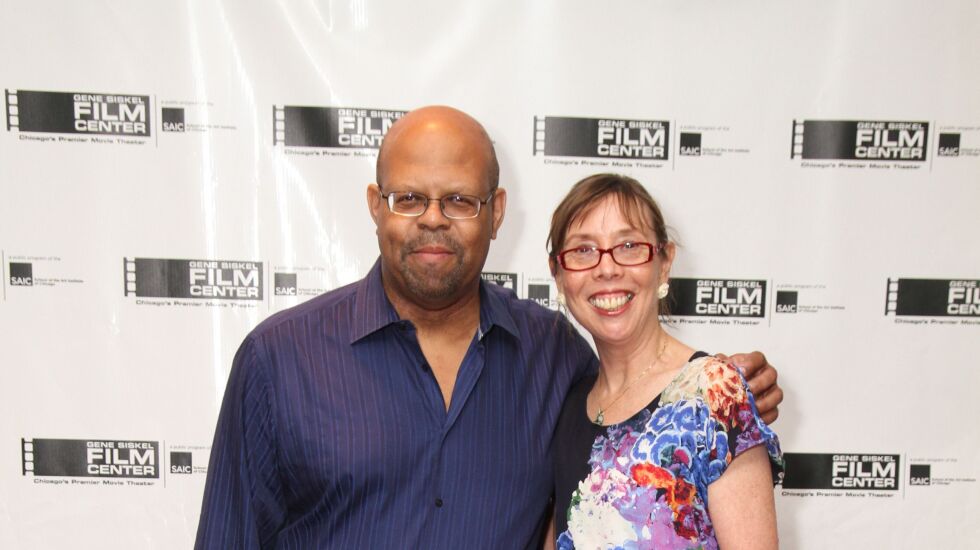
Members of the film industry and movie buffs are mourning the death of Sergio Mims, a founder of Chicago’s Black Harvest Film Festival.
“The Chicago film community just lost a great film critic, film historian and film ambassador,” tweeted George Tillman Jr., who produced three “Barbershop” movies and the “Barbershop” TV series as well as the films “Beauty Shop,” “The Hate U Give” and TV’s “Soul Food” series. “RIP Sergio. You were one of a kind. I still remember you sneaking me into those early film screenings with Roger Ebert and Gene Siskel.”
Also on Twitter, Turner Classic Movies posted: “We are saddened to hear of the passing of critic, journalist and co-founder of the Black Harvest Film Festival, Sergio Mims. Mims joined us at TCMFF earlier this year to introduce two films starring the late Sidney Poitier. His knowledge and passion will be greatly missed.”
The Hyde Park resident died Tuesday at 67. He had been in failing health, according to his family.
Visitation for Mr. Mims is planned from 4 p.m. to 7 p.m. Friday at Doty Nash Funeral Home, 8620 S. Stony Island Ave., with a wake there at 2 p.m. Saturday followed by the funeral at 3 p.m. Saturday.
A tribute to Mr. Mims is being planned at the Black Harvest Film Festival next month at the Gene Siskel Film Center of the School of the Art Institute, according to Jean de St. Aubin, executive director of the center.
She said Mr. Mims continued to work as a programmer and consultant for the festival, now in its 28th year.
“He knew everything about film, which he always called ‘pictures,’ ” de St. Aubin said.
Mr. Mims did DVD and Blu-ray film commentaries. He taught screenwriting at the DuSable Black History Museum and Education Center. He participated in film panels and hosted and produced the “Bad Mutha’ Film Show” on WHPK-FM. And he wrote criticism for N’DIGO, for which he also interviewed movie stars.
“He wrote with great depth about the movies ... at a time when Black movies weren’t really covered,” N’DIGO founder Hermene Hartman said.
“He helped so many people,” filmmaker Barbara E. Allen said. “He read people’s scripts. He gave them notes. He encouraged people. He helped build a generation of Black filmmakers.”
Also, she said: “He was hilarious. When he’d look over those glasses, you knew a ‘Sergio-ism’ was coming.”
In 2003, he hosted a lecture series at the film center titled “Images of the Black Male in American Cinema.” His picks ranged from the 1915 film “The Birth of a Nation” to 1978’s “Blue Collar” to “Menace II Society,” which came out in 1993.
“He was definitely not limited to Black cinema,” de St. Aubin said. “He was just a film scholar.”
Mr. Mims, who attended the University of Illinois Chicago, “was a movie buff as long as I can remember, from when he was watching ‘Jason and the Argonauts,’ ’’ a film from 1963, said his sister Lisa Mims, an Indianapolis physician.
In the early 1980s, Mr. Mims helped found Chicago’s Blacklight Film Festival of Black International Cinema.
When the Blacklight festival was about to dissolve, Mr. Mims stepped in to launch the Black Harvest Film Festival with Barbara Scharres, who headed programming at the Film Center of the School of the Art Institute of Chicago, according to de St. Aubin.
“The idea of a Black film festival 27 years ago was still a very, very new thing,” Mr. Mims said in an interview posted on the SAIC website. “Even though there’s always been Black filmmakers and Black cinema and independent Black filmmakers since the Silent Era ... a Black filmmaker was lucky if he had his film shown at any film festival.”
In addition to being an expert on obscure Black film treasures of the 1930s and 1940s, “He loved blaxploitation movies of the 1970s up to all the Oscar winners,” his sister said. “When I was a kid, he took me to the State-Lake to see a martial arts film.”
He enjoyed classical music and cinema soundtracks, especially Maurice Jarre’s score to the 1966 film “Is Paris Burning?” He liked Yul Brynner movies and songs from his Broadway musical “The King and I.”
Monroe Anderson, who edited Mr. Mims’ film column at N’DIGO, said the writer had a broad range of cultural interests: “He was into classical music and the WWF.”
In addition to his sister, survivors include his mother Gladys and another sister, Judith. They hope to establish a foundation in his memory to help Black students interested in film.
“I saw the importance of Black Harvest, but I had no comprehension that it would last this long,” Mr. Mims said in the SAIC article. “But now it’s part of me. I’m gonna keep doing it as long as I can.”







